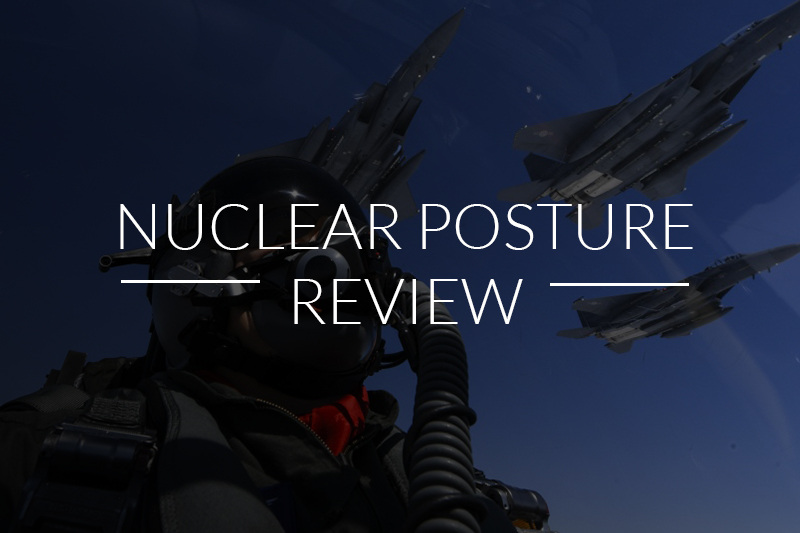
Christopher Colletta
Consultant
Atomic Pulse
Early in 2022, the Biden administration is expected to issue its Nuclear Posture Review (NPR). The nuclear policy community in the United States and around the globe eagerly anticipates this document’s release. What is the NPR and why is it important?
The NPR lays out a U.S. administration’s approach to nuclear weapons policy, based on an extensive internal policy review. Typically, the NPR describes the purpose of nuclear weapons, how the United States will or will not use or threaten to use them, how many and what types of nuclear weapons are required to meet U.S. strategy, and how they fit in to the rest of the government’s military and foreign policy planning.1 Most NPRs also discuss the role the United States will play in preventing nuclear proliferation and reducing nuclear risks globally.
The United States has thus far carried out four NPRs, each conducted early in a president’s term in office and each reflecting the views of the new administration as well as the geopolitical circumstances it faces. The Clinton administration completed the first NPR in 1994 to determine and articulate the role of nuclear weapons in U.S. national security strategy after the Cold War.
The NPR is not itself an operational document but, once it is issued, the Department of Defense, Department of State, and Department of Energy (and other agencies as appropriate) use it to guide and implement policies, plans, budgets, and programs that can have decades-long effects. For example, the Trump administration’s 2018 NPR called for a lower yield nuclear warhead for use on U.S. submarine-launched ballistic missiles, and by 2020 the newly developed W76-2 was deployed on U.S. ballistic missile submarines. Additionally, nuclear modernization and sustainment programs that commenced before and during the Obama administration and will cost around $1.5 trillion over 30 years are still underway today.2
The NPR is an important vehicle for articulating an administration’s nuclear “declaratory policy”— official statements making clear U.S. policy and intentions regarding the role of nuclear weapons and the circumstances under which the United States might use, threaten to use, or pledge not to use them. In addition to informing domestic audiences, U.S. declaratory policy informs other countries of U.S. policy, which often affects their strategic calculations. One example of declaratory policy often included in the NPR is a “negative security assurance,” in which the United States commits to not use or threaten to use nuclear weapons against non-nuclear countries that meet specific criteria. For instance, the 2010 and 2018 NPRs stated that the United States would not use or threaten to use nuclear weapons against non-nuclear weapons states that are party to the Treaty on the Non-Proliferation of Nuclear Weapons (meaning they have pledged not to develop or acquire nuclear weapons) and that are in compliance with their nuclear non-proliferation obligations.
In addition to driving policy decisions related to the United States’ own nuclear weapons, NPRs outline ways to prevent the proliferation of nuclear weapons, materials and technology and to lower the risk of nuclear weapons use by nonstate actors. For example, the Obama NPR made preventing nuclear terrorism a top priority. The resulting Nuclear Security Summits aimed at preventing nuclear terrorism brought negotiators and heads of state from around 50 countries together biannually from 2010 to 2016, making significant progress in securing nuclear materials worldwide.
Who conducts the Nuclear Posture Review?
The executive branch carries out the NPR, normally led by the Department of Defense based on overarching guidance provided by the president through the National Security Council. However, there are no fixed rules governing who is involved in the review or how long it may take to complete. The 1994 review was conducted almost exclusively by the Department of Defense; more recent NPRs have included a broader set of officials from throughout the nuclear weapons, foreign policy, and national security establishment.3
The Clinton and Bush administration NPRs were largely classified. Instead of publishing an unclassified final report, the DoD under the Clinton administration issued a press release with slides summarizing the major decisions made during the review. This material, along with transcripts of briefings to Congress and the news media, constitute the official record of the outcome of the 1994 Clinton NPR.4 The 2002 Bush NPR produced an unclassified foreword to accompany a classified report, though excerpts of the classified report were leaked to the public. Breaking with tradition, the 2010 Obama NPR resulted in an unclassified final report, citing “an effort to be fully transparent in our choices and the thinking behind them”5; the Trump administration followed suit, and the Biden administration is expected to do the same.
President Biden’s Nuclear Posture Review
The Biden administration began its NPR in July 2021 and plans to issue the results in early 2022 along with the National Defense Strategy and the Missile Defense Review, consistent with its pursuit of an “integrated deterrence” strategy. The administration has characterized China’s growing military capabilities as the “pacing challenge” toward which it is tailoring U.S. national security strategy.6 How this will affect the NPR remains to be seen.
As a candidate, President Biden pledged to reduce the role of nuclear weapons in national security strategy and to work with the military and allies to adopt a declaratory policy of “sole purpose” (meaning that the sole purpose of nuclear weapons is to deter or, if necessary, respond to nuclear attack from other countries). Domestic and international audiences will be watching closely to see where the Biden administration comes out on declaratory policy; nuclear force requirements and modernization programs; and diplomacy and arms control to enhance strategic stability, reduce nuclear threats, and prevent nuclear proliferation.
Sign up for our newsletter to get the latest on nuclear and biological threats.
